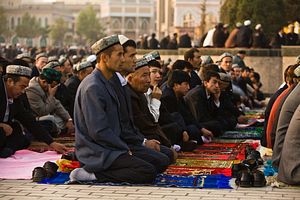Following the attack on the Erawan Shrine on August 18 in central Bangkok, which killed 20, including a number of Chinese tourists, and injured more than 100, Thai authorities and media speculated that the attack could be the work of Uyghur extremists from China’s restive Xinjiang province.
Given the fact that there are other Thai actors with immediate motives to undermine the current military junta, such as disaffected “Red Shirts” (supporters of exiled former Prime Minister Thaksin) and Muslim separatists from southern Thailand, a Uyghur link would appear on the surface to be unlikely.
Yet the Uyghurs have in fact become a thorny issue for the Thai government and other Southeast Asian nations in their relations with China, and further investigation into the extent of the region’s “Uyghur problem” reveals the extent of Beijing’s reach.
Southeast Asia has emerged over the past five years as a major transit zone for Uyghur refugees seeking asylum in Turkey (a country with a well-established Uyghur exile community) and Europe, as their traditional migration routes via Central and South Asia have been closed off by ongoing conflict in Afghanistan and greater security cooperation among governments in those regions with Beijing.
Thailand, in particular, as highlighted by the ongoing controversy regarding people smuggling of Muslim Rohingyas from Burma, has become a hub of illegal migration. It is increasingly apparent that Uyghurs are also now part of such flows. In November last year, Thai authorities discovered around 100 Uyghurs, including women and children, living in squalid conditions in a people-smuggler run camp in southern Thailand, while a further 200 were discovered living in a jungle camp in Songkhla province in March this year.
This has created a major problem for Thailand in its increasingly close relationship with Beijing. Last month, under considerable pressure from Beijing, Thailand forcibly repatriated 109 Uyghurs to China, causing outrage amongst the Uyghur diaspora and human rights NGOs who feared they would face arrest or worse on their return.
The United Nations Human Rights Commission deemed Thailand’s decision to be a “flagrant breach of international law,” while Human Rights Watch described Thailand’s apparent cave in to Chinese pressure as both “shocking and disturbing.” Thai Prime Minister Prayut Chan-ocha’s callous remark at the time that, “If we send them back and there is a problem that is not our fault” certainly did not do anything to combat such criticism.
The core issue at stake here, as Alim Seytoff, president of the Uyghur American Association (UAA), has noted is that China is increasingly able to leverage its economic and strategic weight in countries such as Thailand to seek the forcible return of individuals in “disregard of international human rights conventions and norms” to which it ostensibly abides.
Yet China’s approach should come as little surprise. In fact, it mirrors China’s strategy to combat perceived Uyghur separatism and terrorism in its relations with the Central Asian republics (with which Xinjiang shares borders) over the past two decades, whereby increased Chinese economic investment and aid coincided with greater restrictions and surveillance targeting Uyghur communities and migrants there. Often, official visits by Chinese leaders to these states would be accompanied by the extradition of Uyghur “terrorists” back to Xinjiang and the signing of bilateral economic agreements .
This pattern has been discernible over the past few years in China’s relations with a number of other Southeast Asian countries. In December 2009, for instance, Cambodia, under Chinese pressure, deported 20 Uyghurs back to China and days later inked a lucrative trade and investment package during then-Vice Premier Xi Jinping’s visit to the country. Similar incidents have also occurred in Malaysia, Burma, Laos and Vietnam, with an estimated total of 72 Uyghurs forcibly repatriated to China between 2010 and 2014. The Thai decision to return the 109 Uyghurs also coincided with the Thai navy’s decision to purchase three submarines from China worth $1 billion.
Beijing, for its part has maintained that the Uyghurs were not in fact “refugees” but “jihad recruits” on their way to fight in the Syrian conflict via Turkey. Beijing has cited in this respect the precedent of its arrest of nine Uyghurs and 10 Turkish nationals accused of facilitating their recruitment, en route to Syria in Shanghai in January this year.
In the case of the Thai Uyghurs however, Beijing has proffered little in the way way of evidence. Subsequent footage aired on CCTV of the Uyghurs on their flight back to China handcuffed, hooded and flanked by Chinese security personnel has done little to dispel concerns as to their ultimate fate.
What is clear is that the Uyghur issue is set remain a point of tension in Southeast Asia’s relations with Beijing as these states attempt to deal with growing illegal migration flows and China’s efforts to leverage its strategic weight in pursuit of its own narrow interest in combatting what it perceives as “Uyghur terrorism.”
Dr. Michael Clarke is Associate Professor at the National Security College, ANU. He is the author of Xinjiang and China’s Rise in Central Asia – A History (Routledge 2011).
































